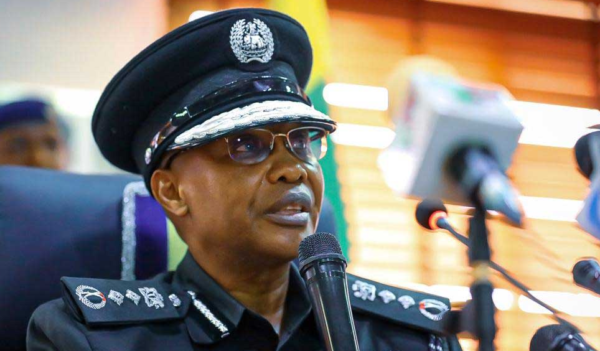Egbetokun Joins Ex-IGPs Adamu, Baba, Others In Tenure Controversy
In recent years, tenures of successive Inspector-Generals of Police have been plagued with controversy, flaring up tempers over the police chiefs’ stay in office beyond the prescribed 35 years of service or the 60 years retirement age.
From the reigns of former IGPs Mohammed Abubakar, Ibrahim Idris and Mohammed Adamu to the times of Usman Baba and now IGP Kayode Egbetokun, civil society groups and other stakeholders have had cause to raise the alarm over (imminent) extension of the IGP’s tenure.
While the presidency yielded to the public outcry during the times of Abubakar and Idris, it granted Adamu, Baba and Egbetokun tenure extension beyond their retirement age or 35 years of service.
What the constitution says
Section 18(8) of the Police Act, 2020 states that, “Every police officer shall, on recruitment or appointment, serve in the Nigeria Police Force for a period of 35 years or until he attains the age of 60 years, whichever is earlier.”
This implies that an IGP, upon servicing a period of 35 years or reaching 60 years, is expected to leave the office, even their tenure has not elapsed.
But about two months to September 4, 2024 when Egbetokun, who was born on September 4, 1964 would clock 60, President Bola Tinubu sent a bill to the National Assembly, amending the Police Act to allow IGP to serve out their tenure.
The President appointed Egbetokun as the IGP in June 2023 for a period of four years, but the former Kwara Commissioner of Police had just spent one year and three months in office in September 2024 when he clocked the retirment age.
“Notwithstanding the provisions of sub-section (8) of this section, any person appointed to the office of Inspector General of Police shall remain in office until the end of the term stipulated in the letter of appointment in line with the provisions of Section 7(6) of this Act,” the new bill stated.
Both the Senate and the House of Representatives passed the bill expeditiously within days.
The bill drew wide criticism which was reignited recently following the arrest of rights activist and former presidential candidate of the Africa Congress Alliance, Omoyele Sowore, who labelled Egbetokun as an “illegal IGP”.
Interestingly, controversy about IGP tenure predates Egbetokun. Some of his predecessors were equally enmeshed in a similar drama.

Abubakar’s scenario
Days to clocking 35 years in service, public affairs analysts mounted pressure on President Goodluck Jonathan to replace IGP Abubakar by July 30, 2014. They urged the then President not to succum to lobbyists pushing for extended time for Abubakar, who was 56.
The International Society for Civil Liberties & the Rule of Law (Intersociety), in a letter dated July 10, 2014, warned Jonathan against the extension of Abubakar’s tenure, saying it could result in his impeachment.
“His statutory retirement is sealed. Any post retirement extension or retention of his service as the country’s IGP is not only a gross violation of the Constitution and her relevant subsidiary provisions, but it is also legislatively impeachable.
“IGP Mohammed D Abubakar with Service No. AP13001 hails from Gusau LGA of Zamfara State, Northwest Nigeria. He was born on 5th May 1958 (56 years) and joined the Nigeria Police Force on 30th July 1979 (35 years by July 30, 2014).
“We are aware of bountiful profile and image laundering campaigns on the pages of the Nigerian paper media by some ‘born before computer’ or ‘typewriter’ senior police officers and their civilian politician/contractor-sponsors including those wanting post statutory retirement re-appointment,” the letter read in part.

Tension mounts during Idris’ last days in office
Till January 3, 2019, his last day in office, there was no hint that the then IGP, Ibrahim Idris, would quit office having attained 35 years in the Nigeria Police Force, though he was 59.
Days prior, insinuations were rife that President Muhammadu Buhari would extend Idris’ tenure, generating reactions from different quarters. The presidency did not make any official statement on the issue.
Idris’ meeting with Buhari on the eve of his retirment further fuelled talks around an imminent tenure extension for the police boss. After the duo met behind closed doors at the Presidential Villa, Idris left beaming with smiles. However, the next day, January 4, Buhari announced Adamu as Idris’ successor.

Adamu’s extended tenure stirs emotions
On February 4, 2021, President Buhari extended the tenure of Adamu by three months. Adamu was due for retirement on February 1, 2021, having spent 35 years in service.
The then Minister of Police Affairs, Mohammed Dingyadi, explained that the extension “to allow for a robust and efficient process of appointing a new IG” —an excuse widely condemned by civil society organisations and sociocultural groups, including Afenifere and Northern Elders Forum.
“It affects morale, it affects careers of those below him (IG) and there is no reason and no excuse for this. Obviously, this is going to be a big disappointment for Nigerians,” Dr Hakeem Baba-Ahmed, who was NEF Director, Publicity and Advocacy, had said.

Baba exits amid tenure crisis
Perhaps, Egbetokun inherited the controversy surrounding his tenure from his immediate predecessor, Usman Alkali Baba. Baba had clocked 60 years of age in March 2023 and attained the mandatory 35 years of service but he remained in office untill Tinubu appointed Egbetokun as his replacement months later.
In May 2023, Justice Fatun Riman of the Federal High Court sitting at Awka, Anambra State, declared the continued stay in office by Alkali as illegal and unconstitutional.
Justice Riman maintained that the IGP, being a public servant, ought to have stepped down on March 1, when he clocked the 60 years mandatory retirement age.
FG, lawyers divided over tenure extension
The Attorney-General of the Federation and Minister of Justice, Lateef Fagbemi (SAN), who admitted that Egbetokun’s tenure would have ended when he attained 60 years of age on September 4, 2024, has justified the IGP’s continuous stay in office, citing Police Amendement Act.
“The continuous stay in office of the Inspector General of Police, Kayode Egbetokun, is legal and lawful. The appointment of Egbetokun which took effect from 31st day of October, 2023 would have come to an end on his attainment of 60 years of age on the 4th day of September, 2024.
“However, before his retirement age, the Police Act was amended to allow the occupant of the office to remain and complete the original four year term granted under Section 7 (6) of the Act, notwithstanding the fact that he has attained the age of 60 years.
“This has, therefore, statutorily extended the tenure of office of Egbetokun to and including 31st day of October, 2027 in order to complete the four year tenure granted to him,” he said.
But a legal practitioner and secretary of the Association of Legislative Drafting and Advocacy Practitioners (ALDRAP), Tonye Jaja, in a letter addressed to Fagbemi, faulted the AGF for declaring the IGP’s continuous stay in office lawful and legal.
“The AGF got it wrong when he declared the tenure elongation lawful. Contrary to the foregoing assertions by the Hon. AGF, I hold the view that it is only through an alteration of Sections 214, 215 and 216 of the 1999 Constitution (as altered) that the tenure of the Inspector-General of Police can be extended.
“The logic behind this argument is that the office of the Inspector-General of Police is a direct creation and established by the 1999 Constitution of Nigeria. Therefore, it is only through an alteration of the said Constitution that changes can be made to the tenure of office of the said Inspector-General of Police,” he stated.
Jaja warned that ALDRAP would file a suit at the National Industrial Court of Nigeria to seek a clarification on the subject matter, if the AGF failed to act accordingly.
Also a human rights lawyer, Hamza Nuhu Dantani Esq, faulted the National Assembly’s passage of the Police Act, warning that extension of IGP’s tenure may have far-reaching consequences on national security. (Daily Trust)


